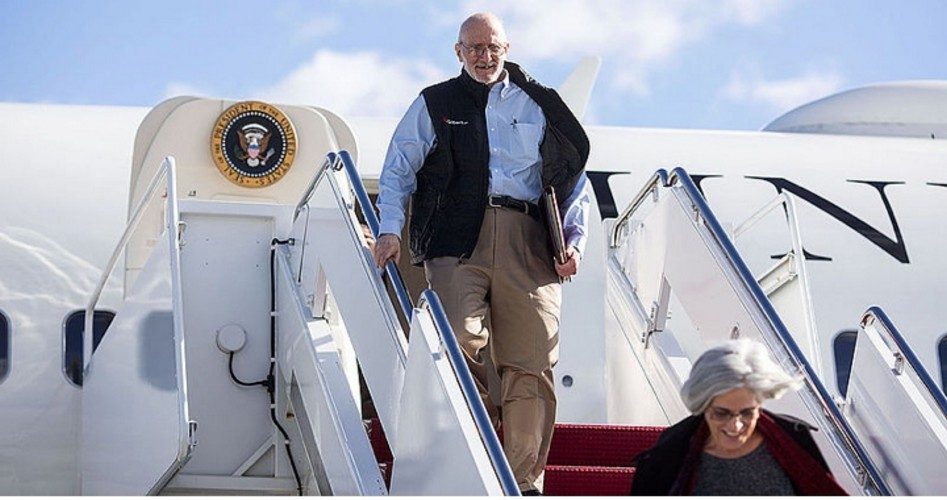
In its 2,000-word summary of the machinations involved in the 18-month-long effort to obtain the release of American citizen Alan Gross (shown) from his filthy Cuban jail cell, the New York Times once again revealed not only its partisan efforts to legitimize the Castro regime but also its intimate familiarity with and support of all the pieces and parts and participants involved in the release of Gross.
The New York Times, of course, has a pro-communist legacy dating back to before the days of Castro’s takeover of that unhappy island in 1959. At that time, the Times’ chief communist apologist, Herbert Matthews, trumpeted Castro’s innocence and purity and support of “liberty, democracy, social justice, the need to restore the [country’s] constitution [and] to hold elections,” providing cover for communist revolutionary Fidel Castro while the Times worked with pro-communist elements in the State Department to force the removal of Cuba’s President Fulgencio Batista and replace him with Castro.
Still making excuses for the Castros, the Times claimed that the release of Gross was a “humanitarian” move by a softening communist regime, while in fact Gross was a bit player in a much larger gambit to exchange a Cuban who spied for America — Rolando Sarraf Trujillo — for the three remaining members of the Cuban Five. The Cuban Five were Cuban spies sent to America to pass along information on anti-Castro organizations and U.S. military base operations. The five were jailed in 1998, thanks in part to information Trujillo funneled to the CIA. Gross was a U.S. social worker working for the U.S. Agency for International Development (USAID) who was arrested for bringing satellite phones and computer equipment to a Jewish community in Cuba.
In 1995, Sarraf worked for Department M-XV, the unit of Cuban Intelligence that maintained encrypted communications between Castro’s dictatorship and a large number of his agents supporting revolution in the United States. Sarraf passed information about those agents to Jose Cohen, another Cuban agent working for the United States, who relayed it to the CIA.
As noted by the Seattle Times, that information was key in identifying and disrupting several Cuban spy rings, which led to a number of spying convictions. Those cases included the convictions of Ana Belen Montes, a Defense Intelligence Agency analyst who rose to become the Pentagon’s top expert on Cuba, and Walter Kendall Myers, a State Department official, and his wife, Gwendolyn Myers. The statement said.
[Sarraf’s] information also led to the uncovering of the so-called “Wasp Network” of more than 40 Cuban spies who infiltrated anti-Castro exile groups in Florida. The spies included the “Cuban Five,” three of whom were those swapped for [Sarraf]. [The other two were already released after having served their sentences.]
The Times article detailed the efforts by Secretary of State John Kerry and President Obama, along with Pope Benedict XVI and Pope Francis. Secret meetings were held in Canada, Oman, and at the Vatican. Noted the Times:
The pope’s new secretary of state, Cardinal Pietro Parolin, an Italian, had served as papal nuncio in Venezuela and was well versed in Latin America politics.
Things came together in October when the Vatican hosted a meeting of American and Cuban negotiators during which “they sealed the final terms of the agreement.” On November 6, two days after the midterm elections, Obama met with his National Security Council to inform them of the agreement and the consequent “new policy” toward Cuba.
According to remarks by the president,
We will end an outdated approach that for decades has failed to advance our interests and instead we will begin to normalize relations between our two countries.
These 50 years have shown that isolation has not worked. It’s time for a new approach.
That “new approach” will expand travel privileges to the open-air prison. Now allowed will be family visits, official visits, journalist visits, professional, educational, and religious visits, as well as “public performances.” Ordinary tourists, for the moment at least, won’t be allowed to visit the island or its prison camps.
None of this cuts it with Senator Marco Rubio (R-Fla.), whose parents immigrated to the United States from Cuba in 1956. Said Rubio:
No commitment was made to allowing the establishment of political parties or to even begin the semblance of a transition to democracy….
This entire policy shift announced today is based on an illusion, on a lie … the lie and the illusion that more commerce and access to money and goods will translate to political freedom for the Cuban people. All this is going to do is give the Castro regime — which controls every aspect of Cuban life — the opportunity to manipulate these changes to perpetuate its sovereign power….
These changes will lead to legitimacy for a government that shamelessly [and] continuously abuses human rights. But it will not lead to assistance for those whose rights are being abused.
It is just another concession to a tyranny — by the Obama administration — rather than a defense of every universal and inalienable right that our country was founded on and stands for. In short, what these changes are going to do is they will tighten this regime’s grip on power for decades to come.
That must be the victory the Times referred to when it celebrated “the deal that freed an American jailed in Cuba and ended 53 years of diplomatic estrangement … that was blessed at the highest levels of the Holy See.”
A graduate of an Ivy League school and a former investment advisor, Bob is a regular contributor to The New American magazine and blogs frequently at www.LightFromTheRight.com, primarily on economics and politics.
Related articles:
Globalists, UN, and Big Business Legitimizing Cuban Regime


